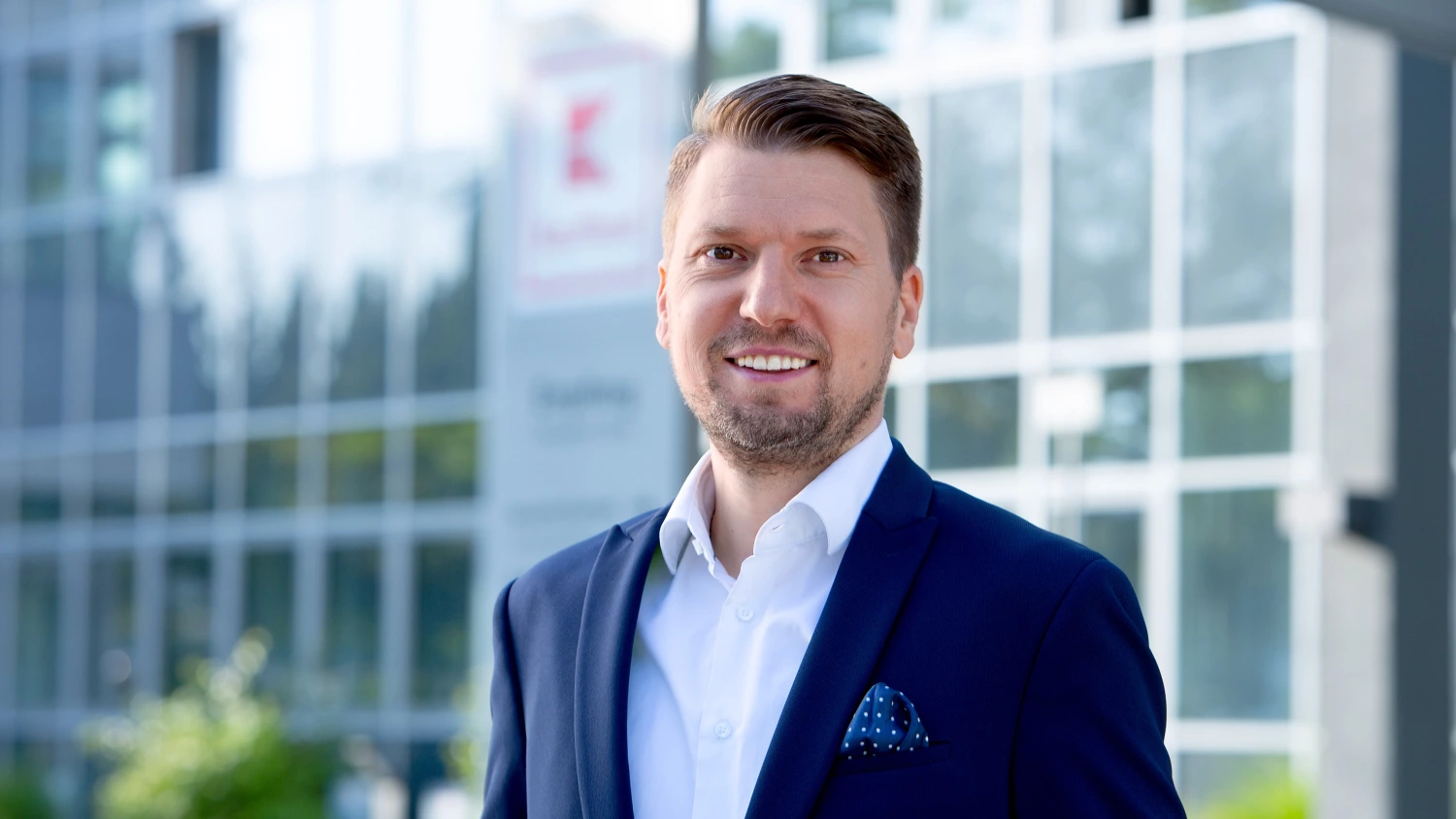
Dominik Uhe, Head of Investor Relationship Management at Kaufland International, shared insights into the retail giant’s evolving role in the supermarket sector, strategies for fostering investor confidence, and the company’s commitment to ESG innovation. With a focus on flexibility, long-term partnerships, and sustainable development, Dominik offers a forward-looking perspective on how Kaufland is shaping the future of retail real estate in CEE and beyond.
You’ve recently taken on the role of Head of Investor Relationship Management at Kaufland. What are your key priorities for the next 12 months?
I am very grateful for this opportunity. During my ten-plus years at Kaufland, I have gained extensive experience across various roles, building a knowledge base that is invaluable for this comprehensive and multifaceted task. Over the next twelve months, I will make intensive use of this expertise to position Kaufland's strengths and address our challenges in the property market. At the same time, I want to use my expertise and contribute to the development of collaborative solutions and continue to strengthen the future of the (retail) real estate sector while remaining approachable and authentic.
How do you see Kaufland’s role in the supermarket sector evolving over the next 5-10 years, and how do you intend to communicate this strategic direction to investors?
Kaufland currently operates over 1,550 large supermarkets, with a significant presence in the CEE region. As a strong and reliable partner, we maintain sustainable, long-term growth across all our markets through a multifaceted approach. One of our key strengths lies in our flexibility. This means we are able to meet stakeholder needs through customized location development- from stand-alone stores to centre locations, mixed-use properties or revitalization projects, to name just a few of the possibilities. This flexibility extends to both our owner-occupied and increasingly leased properties. To this end, we are actively expanding our cooperation and partnerships with both existing and new institutional investors. After all, we also need strong partnerships in order to grow. It is therefore important to present these key messages to our potential partners, seek dialogue and, ideally, develop long-term partnerships. The property forum format is very important to us in achieving this. On the one hand, this allows us to show investors who we are, how we see the market and where we want to go, but also allows us to develop and strengthen partnerships.

Dominik Uhe
Head of Investor Relationship Management
Kaufland International
What are your key strategies for building and maintaining investor confidence in a competitive and fluctuating retail landscape?
Continuous and sustainable growth, trusting, reliable and long-term partnerships. However, comprehensible and competitive strategies for the future also create trust among investors. As a leading retailer within the Schwarz Group, Kaufland, delivers consistent and, above all, sustainable growth. We offer a unique ecosystem across the entire value chain - from production and retail to recycling and our digital services. Our goal is to always be one step ahead. At Kaufland, we combine these characteristics and offer our customers a one-stop shopping experience, available both in-store and via our online marketplaces. We are also consistently advancing our property portfolio, both new builds and existing properties, in line with ESG standards as well as going one step further in many areas.
What is your overall outlook for the retail market in 2025? Which word will we hear the most during discussions concerning this sector next year?
The last few years have shown how difficult it is to anticipate the future. But I’ve polished my crystal ball and I'm going to make a prediction. I believe that the investment climate in the real estate sector will continue to improve in 2025. Retail property, in particular, will remain a sought-after asset class due to its stability. As macroeconomic factors like inflation recede, we can refocus on real estate-specific topics again. In addition to ESG, artificial intelligence will be our main area of focus in 2025. Discussions will centre around the technology’s vast potential, as well as its yet-to-be-determined risks. We look forward to exploring the exciting applications and implications within this context in many panel discussions.
Which countries in CEE are driving growth for Kaufland these days? How would you summarise your development strategy in the region?
Our growth is driven by the entire CEE region, which is so important to us. We have maintained a strong presence here for over 20 years, growing together with the countries. Even after relevant crises, the CEE countries have demonstrated robust and positive development and Kaufland has proven to be a reliable and strong partner throughout this extended period of time. Our customers, investors and the communities in which we operate can count on our commitment. At the same time, the individual countries within this region present different opportunities and challenges. Our strategy going forward is steady organic growth, with the pace varying from country to country. We are flexible in the implementation of this growth through a range of approaches, from stand-alone stores to mixed-use developments and revitalisation, everything is feasible for us. At the same time, we have demonstrated the ability to drive inorganic growth in several countries, leveraging our expertise to upgrade the quality of existing retail locations. In addition to investor relationship management, I am also involved in the strategic expansion of our company and for this reason, the evaluation of new markets is always of great importance.
What are the deciding factors when it comes to securing the ideal location for a new Kaufland store? Are you looking to add more stores in mixed-use schemes?
Our flexible store concepts position us to adapt to all retail locations. We are seeking locations from approx. 2,000 sqm of sales area or sites from approx. 6,000 sqm in towns and cities with a population of 10,000 or more. Whether these are undeveloped sites or existing properties, available for rent or purchase, is of secondary importance - together we’ll find the right solution for the right location. Mixed-use developments are playing an increasingly important role in our expansion strategy and we also aim to strengthen our presence in this segment further. We are open to new partnerships in this area.
What were Kaufland’s key ESG achievements in 2024 and what are you most looking forward to in 2025 in this regard?
ESG plays an important role, especially in strengthening the resilience of our company. We started early in establishing ESG standards in our property development processes. In 2024, we implemented two exemplary projects that showcase our dual approach. In autumn 2024, we constructed a store in Tuttlingen, southern Germany, where increased the use of recycled building materials. This significantly reduced the carbon footprint of the store's construction, particularly in terms of grey energy. We are thus increasingly establishing the cradle-to-cradle principle across our operations. At the same time, we are focused on expanding the use of renewable energy sources, such as photovoltaics, to reduce our stores’ electricity consumption among other things. We are well-positioned in addressing the E in ESG and are constantly developing further in this area.
This year, we completed another very special project in Bulgaria's capital, Sofia. We undertook the sensitive revitalisation of the historic 1911 market hall located in the city centre. Working with renowned conservators we completed the renovations within eleven months, preserving the building’s distinguished character. A particular highlight is the Roman excavation site in the basement, where we have curated a small museum and a virtual reality experience. This allows citizens to immerse themselves in ancient Roman Serdica. Our colleagues also organise regular readings, small concerts and other cultural highlights to engage the local community of Sofia within the impressive setting. This project is a very good example of how we can meaningfully address the ‘S‘ in ESG. Compliance here extends far beyond just installing photovoltaics.
Moving forward in 2025, we will continue pursuing this multifaceted approach, with a particular focus on revitalisation projects as we expand. Since 2022, we have been monitoring our progress through an annual ESG rating. The positive development affirms our path to date and provides valuable guidance for our continued development.



